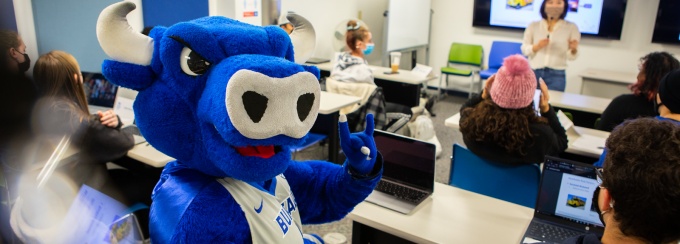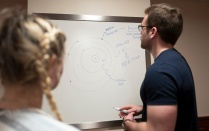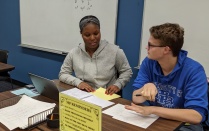Studying Tips & Resources
From personalized tutoring sessions to effective study strategies, we're here to support you every step of the way in your academic journey.

Jump to:

Tutoring and Academic Support Services
This tutoring center is located at 130 Capen Hall with appointments from Monday-Friday, 9 a.m.-6 p.m. for tutoring for Biology and Chemistry.

Academic Success Center
Receive tutoring with Jacob’s upperclassmen in-person, on South Campus, or Zoom for Biology and Chemistry. Sign up for an appointment!

The Math Place
This is a drop-in tutoring center located at 211 Baldy Hall. You can stop by without an appointment any time Monday-Thursday between 10 a.m.-7 p.m. for help in calculus and pre-calculus.
Study Buddy
Study Buddies is a feature within the Navigate mobile app or desktop site that allows you to opt-in to connect with students in each of your classes who are interested in forming study groups. How you choose to interact can be decided by your group, whether it be in-person or virtually.
Study Spaces
The University Libraries offer various types of study spaces for different study needs: silent, quiet, individual study areas; group study areas; and individual and collaborative study rooms.
Wellness Coaching
Taking a positive approach to personal development, Wellness Coaches focus on helping students set and achieve meaningful goals by helping with time and stress management.
Student Life Wellness Events
There is a strong connection between your well-being and academic success. With intentional emphasis on health promotion; emotional and mental support and the delivery of high-quality medical services, we help foster a vibrant and healthy campus community.
Step 1: Identify
Write down what thoughts you are having that are causing you anxiety.
Step 2: Evaluate
Are these thoughts correct?
Example: If I don't do well on this test/paper, I will certainly flunk the class.
Why is this likely incorrect? This is just one test. There are others for this class. There is extra credit. It is graded on a curve, so in comparison to others, I might be doing great. The grade is based on more than just this test. (And, even if I did flunk the class-it's not the end of the world.)
To Do: Write down why the thoughts you listed are likely incorrect.
Step 3: Respond
What would be a better (more useful) thought about an exam or studying?
Example: I've done well before on tests. I can do well on this one, too. I'll put in a good effort. There will be many more exams. This is just one exam.
To Do: Respond to the thoughts you wrote down.
Step 4: Relax
Because our bodies physically feel the stress of our initial unhelpful thoughts, we can directly change this by using various relaxing techniques.
- Tense and relax muscles. Tense various muscle groups for five seconds. Then relax. Do this throughout your body.
- Take deep slow breaths. Four seconds in. Hold for four. Six seconds out. Pause briefly. Think of breathing in relaxation and say "relax" to yourself. Say "calm" as you exhale.
- Investigate other ways to relax. You might go for a walk. You might listen to relaxing music or ambiance.
Final Notes
Practice! Practice! Practice!
It's helpful to get good at using these techniques. The best way is to practice when you are NOT feeling extremely stressed. Then, later when you are stressed, you'll have the tools to deal with it.
Set aside time each day
Try setting a timer for at least 30 minutes every day to study. If you're particularly busy, even 15–20-minutes can be helpful.
Make a smart study space
Your study space should be free of distractions. Having the TV or videos playing in the background is only going to hurt your study time. Try to keep your phone in your pocket or bag to avoid temptation.
Use the PowerPoints
If your professor used a PowerPoint but didn’t share it, email them as soon as possible to ask if you can have a copy.
Make flashcards
Even just creating flashcards can be helpful. It’s been proven that physically rewriting the information helps you remember! Once the cards are done, you can use them to further review or quiz yourself during a study session.
Join or start a study group
Try asking your classmates if they would be willing to form a study group, in person or over Zoom. Hearing the material from someone else and rephrasing it are excellent ways to reinforce information. As a bonus, classmates might have study tips they’ve found that work for you.
Background noise
It isn’t recommended to listen to music with lyrics while you study, but there are other ways to get background noise. White noise, nature sounds, or instrumental music are all ways to fill the silence while you study and help you make the most of your time.

Nathan J. Milroy
Academic Advisor
Jacobs School of Medicine and Biomedical Sciences, University at Buffalo

Sarah Page
Student Success Coach
40 Biomedical Education Building
Jacobs School of Medicine and Biomedical Sciences, University at Buffalo
Phone: 716-829-2498
Email: spage@buffalo.edu